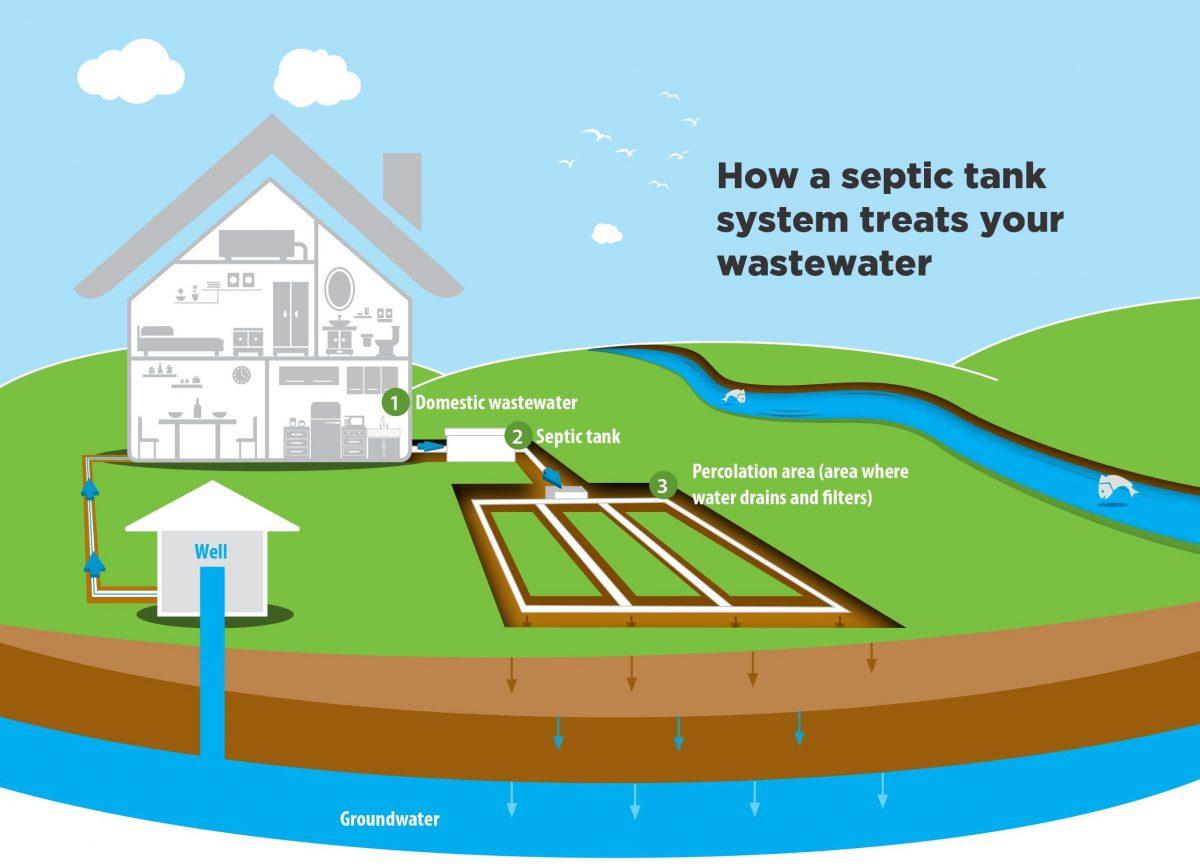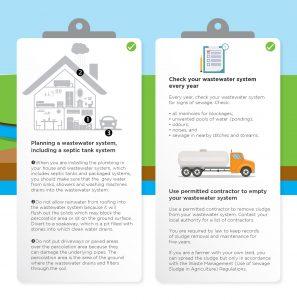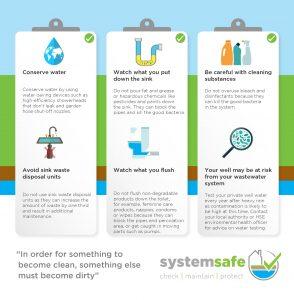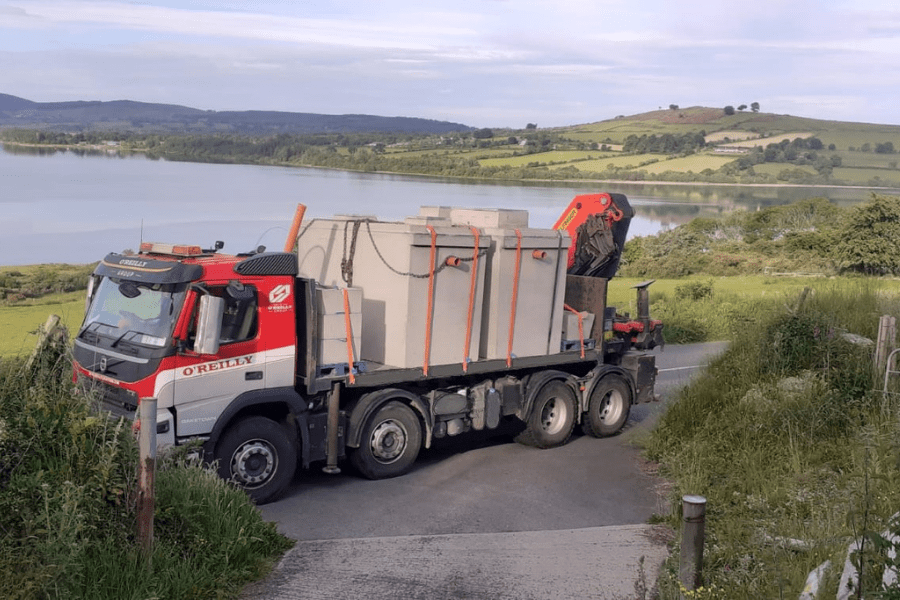Completing Septic Tank System Check
Maintaining your wastewater system will help to protect your health and the local environment. As a homeowner, the law obliges you to make sure your system is installed, operated and maintained in a way that makes sure it doesn’t pose a risk to human health and the environment.
Text and images in this post are from the EPA website.
How a septic tank system treats your wastewater
1. Everything you flush down the toilet and send down the sinks, showers and washing machine or dishwasher ends up in your septic tank system.
2. Wastewater flows from the house to the septic tank. The solids and scum form sludge in the tank and this needs to be removed regularly.
3. Liquid effluent (wastewater) percolates down from the pipes through the soil in your garden into the percolation area. The soil itself helps filter out the bacteria before making its way to the groundwater in the bedrock below. This is the same groundwater that supplies water for any local wells.
“A well maintained system in the right site with the right soil conditions will protect your health, your local environment and your pocket.”
Planning a wastewater system, including a septic tank system?
- When you are installing the plumbing in your house and wastewater system, which includes septic tanks and packaged systems, you should make sure that the grey water from sinks, showers and washing machines drains into the wastewater system.
- Do not allow rainwater from roofing into the wastewater system because it will flush out the solids which may block the percolation area or sit on the ground surface. Divert to a soakaway, which is a pit filled with stones into which clean water drains.
- Do not put driveways or paved areas over the percolation area because they can damage the underlying pipes. The percolation area is the area of the ground where the wastewater drains and filters through the soil.
Check your wastewater system every year!
Every year, check your wastewater system for signs of sewage. Check the following:
- all manholes for blockages
- unwanted pools of water (ponding)
- odours
- noises
- sewage in nearby ditches and streams.
Use a permitted contractor to empty your wastewater system
- Contact your local authority for a list of contractors, or search for one on the NWCP website
- You are required by law to keep records of sludge removal and maintenance for five years.
- If you are a farmer with your own land, you can spread the sludge but only in accordance with the Waste Management (Use of Sewage Sludge in Agriculture) Regulations.
What is the difference between a septic tank system and a packaged treatment system?
A septic tank system depends more on the soil in the percolation area to treat wastewater. A packaged treatment system relies less on the soil but has more mechanical parts to treat the wastewater. Packaged treatment systems, therefore, need some more maintenance. Sludge has to be removed from both types of systems.
Actions to take
Conserve water
Conserve water by using water-saving devices such as high-efficiency showerheads that don’t leak and garden hose shut-off nozzles.
Avoid sink waste disposal units
Do not use sink waste disposal units as they can increase the amount of waste by one third and result in additional maintenance.
Watch what you put down the sink
Do not pour fat and grease or hazardous chemicals like pesticides and paints down the sink. They can block the pipes and kill the good bacteria.
Watch what you flush
Do not flush non-degradable products down the toilet, for example, feminine care products, nappies, condoms or wipes because they can block the pipes and percolation area, or get caught in moving parts such as pumps
Be careful with cleaning substances
Do not overuse bleach and disinfectants because they can kill the good bacteria in the system.
Test your well every year as it may be at risk from your wastewater system
Your private well, if you have one, may be at risk from your wastewater system so test it every year after heavy rain as contamination is likely to be high at this time. Contact your local authority or HSE environmental health officer for advice on water testing.
“In order for something to become clean, something else must become dirty”
Frequently asked Questions
What are my responsibilities as a homeowner?
The law obliges you to make sure your system is installed, operated and maintained in a way that makes sure it doesn’t pose a risk to human health and the environment.
What is the sludge in the system?
All of the wastewaters from your home go into your system. The sludge is a build-up of all solids.
Why do I need to remove the sludge from my septic tank system?
The sludge must not build up too much or your system will stop working properly. If the sludge is not removed, it can block the pipes in your percolation area. If this happens it is very difficult to clean and may require replacement – an expensive option! It could also cause a risk to human health and the environment.
How often should I remove the sludge from my system?
Research is ongoing to provide more specific advice, but the sludge should be removed from the tank when the sludge takes up more than half of the liquid depth in the tank or at least every five years. A minimum of 75 mm of sludge should remain in the tank as it contains billions of the good microbes necessary to help breakdown the new solids. Use a permitted waste contractor and keep your receipt.
Who can remove the sludge from your system?
If you are a farmer with your own land, you can spread the sludge from your own wastewater system but only but only in accordance with the Waste Management (Use of Sewage Sludge in Agriculture) Regulations. Read more here.
If you do not have your own land, you must get the sludge removed by a permitted contractor, find one here
Where does the sludge go?
Permitted contractors bring the sludge to authorised facilities for treatment. Details on permitted contractors operating in your county are available from your local authority
 Around 500,000 households in Ireland have a wastewater system that includes septic tanks and packaged systems. About 137,000 of these also have a private well for drinking water. Since 2013, all homeowners with a wastewater system must be registered with their local authority (LA). The Environmental Protection Agency (EPA) is an independent public body. We are responsible for supervising local authorities when they inspect wastewater systems. We do this to ensure that the systems are suitable and well maintained.
Around 500,000 households in Ireland have a wastewater system that includes septic tanks and packaged systems. About 137,000 of these also have a private well for drinking water. Since 2013, all homeowners with a wastewater system must be registered with their local authority (LA). The Environmental Protection Agency (EPA) is an independent public body. We are responsible for supervising local authorities when they inspect wastewater systems. We do this to ensure that the systems are suitable and well maintained.
A quarter of wastewater systems (25%) inspected failed the LAs inspection due to poor operation and poor maintenance. Poorly maintained wastewater systems can affect your drinking water especially from private wells. Many people assume that their private well water is safe to drink and don’t treat it or get it tested. They shouldn’t because a recent study found that E.coli, which can cause serious illness, is present in almost a third (29%) of Irish private wells.
Where to find more information on Septic Tank System Checks
For more information, contact your local environment section or visit www.maintainyourseptictank.ie.
Also, download the ‘Have you completed a septic tank system check‘ PDF.
Contact us to find out more
Contact our team today to enquire about our septic tank and wastewater treatment systems, and they will help you find the best system for your home.








